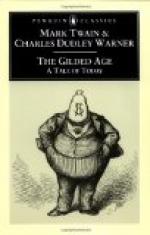“Your argument! Why, you were a witness.”
“Oh, yes, to the popular eye, to the popular eye—but I knew when I was dropping information and when I was letting drive at the court with an insidious argument. But the court knew it, bless you, and weakened every time! And Brabant knew it. I just reminded him of it in a quiet way, and its final result, and he said in a whisper, ’You did it, Colonel, you did it, sir—but keep it mum for my sake; and I’ll tell you what you do,’ says he, ’you go into the law, Col. Sellers—go into the law, sir; that’s your native element!’ And into the law the subscriber is going. There’s worlds of money in it!—whole worlds of money! Practice first in Hawkeye, then in Jefferson, then in St. Louis, then in New York! In the metropolis of the western world! Climb, and climb, and climb—and wind up on the Supreme bench. Beriah Sellers, Chief Justice of the Supreme Court of the United States, sir! A made man for all time and eternity! That’s the way I block it out, sir—and it’s as clear as day—clear as the rosy-morn!”
Washington had heard little of this. The first reference to Laura’s trial had brought the old dejection to his face again, and he stood gazing out of the window at nothing, lost in reverie.
There was a knock-the postman handed in a letter. It was from Obedstown. East Tennessee, and was for Washington. He opened it. There was a note saying that enclosed he would please find a bill for the current year’s taxes on the 75,000 acres of Tennessee Land belonging to the estate of Silas Hawkins, deceased, and added that the money must be paid within sixty days or the land would be sold at public auction for the taxes, as provided by law. The bill was for $180—something more than twice the market value of the land, perhaps.
Washington hesitated. Doubts flitted through his mind. The old instinct came upon him to cling to the land just a little longer and give it one more chance. He walked the floor feverishly, his mind tortured by indecision. Presently he stopped, took out his pocket book and counted his money. Two hundred and thirty dollars—it was all he had in the world.
“One hundred and eighty . . . . . . . from two hundred and thirty,” he said to himself. “Fifty left . . . . . . It is enough to get me home . . . .. . . Shall I do it, or shall I not? . . . . . . . I wish I had somebody to decide for me.”
The pocket book lay open in his hand, with Louise’s small letter in view. His eye fell upon that, and it decided him.
“It shall go for taxes,” he said, “and never tempt me or mine any more!”
He opened the window and stood there tearing the tax bill to bits and watching the breeze waft them away, till all were gone.
“The spell is broken, the life-long curse is ended!” he said. “Let us go.”
The baggage wagon had arrived; five minutes later the two friends were mounted upon their luggage in it, and rattling off toward the station, the Colonel endeavoring to sing “Homeward Bound,” a song whose words he knew, but whose tune, as he rendered it, was a trial to auditors.




